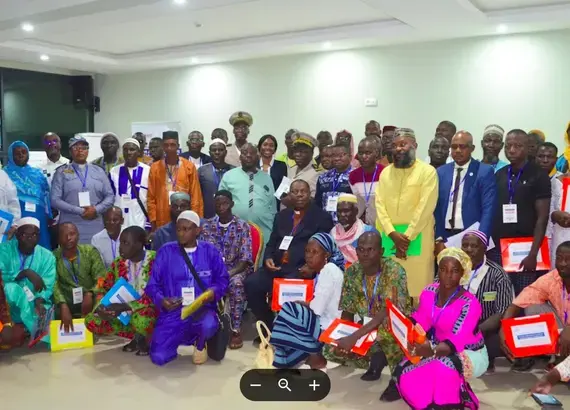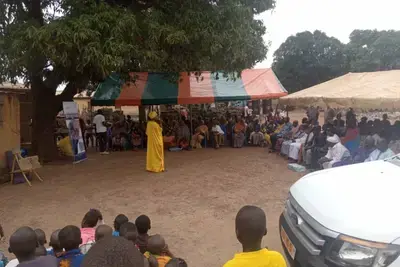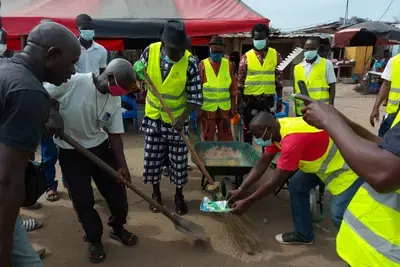
Success Story
Religious leaders meet to prevent violent extremism in Côte d’Ivoire
In the northern Ivoirian city of Korhogo, dozens of Christian and Muslim religious leaders from cities along the border between Burkina Faso, Mali, and Côte d’Ivoire put pen to paper on July 22, 2023, to sign a pact promising collaboration, friendship and fraternity. This cross-community achievement occurred in a context of otherwise rising tensions between Côte d’Ivoire and its neighbors to the north, where military coups have resulted in frayed diplomatic relations and violent extremist attacks regularly claim lives.
While Côte d’Ivoire has not had a terrorist attack since 2021, violent extremists have been moving closer. There is growing evidence that Ivoirian territory is being used as a safe haven to raise funds from illegal gold mining and other illicit activities. Many Ivoirians fear that extremist groups are also clandestinely recruiting people to their cause and infiltrating northern border cities in preparation for future expansion into Ivoirian territory, setting the whole region on edge.
In light of these fears, religious leaders from Cote d’Ivoire invited their peers in Burkina Faso and Mali to visit in an effort to foster communication and collaboration on security issues. The border communities share many common demographic and linguistic traits, and religious leaders from Burkina Faso and Mali are already dealing with violent extremism in their respective localities. The leaders all recognized that information sharing within communities across religious and ethnic lines, as well as across borders, could strengthen resilience to violent extremist threats if each community can play an early warning role and alert each other of any suspicious activity.
In May, NDI, with funding from USAID, facilitated visits by faith leaders from eight Malian border towns to their closest counterparts in the Ivoirian towns of Tengréla and M’Bengué and by four Burkinabe towns to their counterparts in the Ivoirian town of Ouangolodougou, where recent influxes of refugees escaping extremist violence have raised concerns. The visitors from Mali and Burkina Faso heard about Ivoiran faith leaders’ collaborative initiatives and interfaith dialogues about peace, social cohesion, and preventing violent extremism over the previous three years and shared their own experiences.
Building on the success of these visits, NDI organized a two-day conference in July that brought together 105 people, including faith leaders and prefects from all of the three countries, as well as representatives from the Ivoirian PNDI (National Interfaith Dialogue Platforms) and Ivoirian community leaders. US ambassadors and representatives from NDI also participated.
Participants shared their experiences living under the threat of violent extremism and how to effectively combat it. A government representative from Korhogo said that he “observed the phenomenon of radicalization” in his region and asked for “similar initiatives like the one we’re having today to be repeated.” An imam from Korhogo affirmed that “the real problem today is the problem of education” and called for more than awareness raising. A pastor from Mali recognized the importance of the model of the PNDI and of working together across borders, saying: “Ivorians, Burkinabes and Malians are all brothers, especially at the border, so it goes without saying that we can join hands. We mustn't use religion as an excuse to separate us”.
Participants also shared their views and experiences about what had worked well and what had failed so far in preventing and countering terrorist action and what lessons they could learn from each other. Specific strategies they discussed as important included raising awareness among the public about the nature of the threat and how to respond if unusual activity is observed; one pastor from Burkina Faso emphasized the need for “awareness-raising to prevent terrorism, especially for women and young people.” Participants also recommended creating interfaith platforms like the Interfaith Local Dialogue Platforms for Countering Violent Extremism (PLDI-EVs) that have been created in Cote d’Ivoire.
Within the months following the conference, nearly all of the participating towns had set up their own versions of the interfaith platforms. In Burkina Faso, a pastor discussed the changes in his locality of Dangoindougou after his return from the conference. He said that he was “very happy” to share the results of the conference with “the village chief, the president of youth and women’s groups, and leaders from other community groups”. The pastor also mentioned the positive advancements in his locality since the conference; “we were able to set up a local office for religious leaders to combat violent extremism. We also have organized clean-up days, services in mosques and churches, and events between Christians and Muslims. Since the conference, our locality has set up a monitoring mechanism which enables us to report suspicious individuals to the prefect.” Overall, since the development of those tools thanks to the conference, the pastor has seen “a reduction of barriers of distrust among the community and between different religious groups.”
Participants also looked forward to organizing additional social and awareness-raising activities among the various communities to maintain open channels of communication and build trust. In the same vein, they have created and maintained active social media groups, allowing them to communicate freely and regularly. Political leaders also called for this type of interaction to be repeated. One sub-prefect of the Latah region in Côte d’Ivoire called for “these initiatives to be repeated to eradicate violent extremism with the help of religious leaders.”
At the end of the conference, all religious leaders and participants drafted and signed the pact on collaboration, friendship, and fraternity, which commits them to strengthen cross-border monitoring efforts to effectively prevent and combat the phenomenon of violent extremism. “By your mobilization and your presence, you religious leaders are sending a strong message to the populations, politicians and opinion leaders of Côte d'Ivoire, Mali and Burkina Faso," said Christopher Fomunyoh, NDI’s Africa director. Participants expect this agreement to reinforce all participating communities’ resilience against violent extremism and provide a more safe and more stable environment for all.


